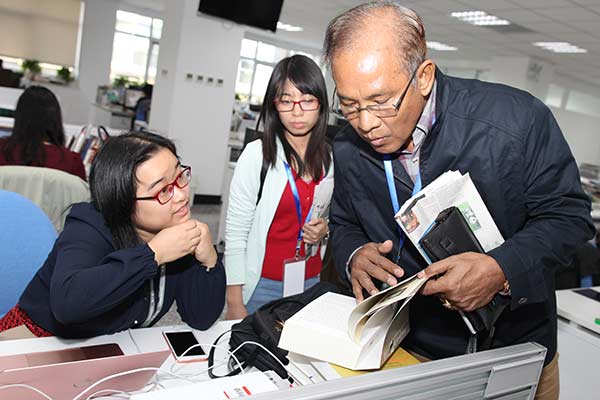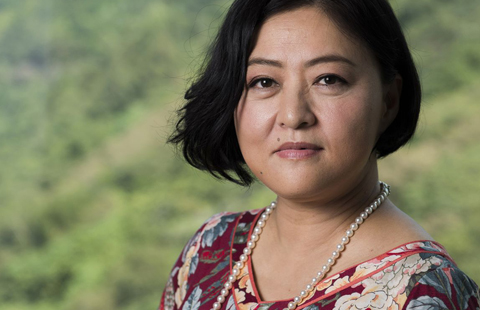China boosts soft power by training foreign journalists
Updated: 2016-10-17 06:46
By YUAN ZHOU/ZHANG ZHIHAO(China Daily)
|
||||||||
 |
|
Win Tin (right), from Myanmar, and Pham Thi Hai Ha (middle), from Vietnam, visit China Daily newsroom during their training program in Beijing on Sept 28. [Photo/China Daily] |
On a recent Saturday morning in Beijing, Win Tin, 66, a veteran journalist from Myanmar, was enthralled by a lecture at the Communication University of China on setting up a digital studio, from floor layouts to overhead light temperatures to software.
Two months ago, Tin, with 25 years of experience in journalism, started an online news outlet, Northern Light Media, but realized he knew little about online media.
So he jumped at the offer to join a 10-day media workshop provided by the university's China-ASEAN Center of Training that targets media executives and journalists from Southeast Asian countries.
"I want to be a lifelong learner, and China is the country I'm most interested in," said Tin, whose fellow trainees, totaling 21, come from Vietnam, Thailand, Malaysia and the Philippines.
The training program-supported by the Chinese Ministry of Foreign Affairs, Ministry of Education and Huaneng Industry, a State-owned energy company-is not the first international project at top Chinese journalism schools.
Since 2014, the School of Journalism and Communication at Renmin University of China has trained at least 10 journalists from African media each year in an exchange program organized by the China-Africa Press Center. This year, the program has received 28 African journalists, the largest group yet.
Every year, the university also admits five young journalists from Pakistan. In nine months, "they studied various aspects of China, built friendships and strengthened their Chinese counterparts' understanding of Pakistan", said Zhong Xin, director of the school's international affairs.
Tsinghua University's master's program in global business journalism, taught in English, admits 20 international students each year. About 200 of them from 50 countries have graduated, said Hang Ming, the program's co-director.
Some programs that train foreign journalists at CUC and Remin University programs is fully paid by schools or sponsors, while the master's program at Tsinghua costs 39,000 yuan ($5,850) per year. Most of the training is done in Beijing, with opportunities for trainees to visit rural areas or small cities.
Hu Zhengrong, president of the CUC and a lecturer of the program for Southeast Asian journalists, estimated more than 100 foreign journalists study in China each year, most from developing countries in Africa, Asia, and Europe.
"China is the world's second-largest economy and a significant stakeholder in global affairs, but its soft power needs to manifest itself through people to people, heart to heart dialogues," Hu said.
"Training foreign journalists in China allows them to experience the country's full complexity, thus ensuring more objectivity and consideration when they portray China to their audience," he added.
CUC provides practical training in new and innovative techniques such as media convergence, big data, smart solutions and next-generation network technology. The lectures are in English.
"The courses are very informative," said Shamim Abdullah Zahedy, executive editor for the Independent in Bangladesh. "It introduced me to new dimensions in new media and broadened my understanding of the medium."
Professor Zhang Wenhui of CUC, who teaches media technologies, said that China's hands-on experience can serve as a blueprint for the trainees to develop the media industry in their home countries.
Zhang had an interpreter for his lecture, but the presentation was in English and he made sure all terminologies were in sync with international standards. "If someone were to purchase a set of equipment, it would be helpful to know exactly what it is called on the international market," Zhang said.
But Hu said some material is geared towards understanding China.
"I avoid using Western concepts like liberal or conservative because they are loaded with implications and stereotypes that may not reflect China's true conditions," Hu said.
When introducing China to foreigners, it is crucial to let them see China through a Chinese conceptual system, he said, adding that teachers have to be thorough and honest in the process.
International graduates of Tsinghua's program often go into international media, public relations or government organizations. "Some become the bridge that connects China and the world," said Hang, the program's co-director.
The work of graduates has been significant.
Compton Nicholas James, a US graduate of the program, published an investigative report on how Chinese governmental and nongovernmental organizations tackle the issue of left-behind children in China.
After graduating from the program, Park Jinbum, a South Korean student, became a producer at South Korean broadcasting network KBS and produced Super China, an in-depth documentary on China's rise that went viral in 2015.
The training programs not only allow journalists to acquire skills, but also broaden their network of contacts for their future endeavors in content creation, said Steven Dong, dean of the Faculty of Continuing Education at CUC.
Dong said he would like to see more media collaboration, such as Legends of Song and Dance, a joint, 2013 Chinese-Myanmar television series telling the stories between the Tang Dynasty (618-907) and the Kingdom of Myanmar. The series was broadcast in both countries.
Apart from teaching technical skills, future media training programs should include courses on content production, thus "laying the foundation for all-around media cooperation", he said.
Contact the writer at zhangzhihao@chinadaily.com.cn
- Flying club offers bird's-eye view of Pyongyang
- Greeks rally against labor reforms
- New poll shows Clinton's double-digit lead over Trump
- Iraqi forces fighting all out to free Mosul from IS
- Iraqi forces begin major offensive to retake Mosul from IS group
- Thai PM reassures on smooth succession; coronation after king's funeral

 World in photos: Oct 10 - 16
World in photos: Oct 10 - 16
 Fairing fragments of Shenzhou XI found in Shaanxi
Fairing fragments of Shenzhou XI found in Shaanxi
 Feast for the eyes: Photo Beijing 2016
Feast for the eyes: Photo Beijing 2016
 China's Shenzhou spaceship: A proud family
China's Shenzhou spaceship: A proud family
 Journeys toward prosperity
Journeys toward prosperity
 Female investors rise to top of venture capital companies
Female investors rise to top of venture capital companies
 Peng Shuai claims title of women's singles at WTA Tianjin Open
Peng Shuai claims title of women's singles at WTA Tianjin Open
 Birthday celebration held for panda cubs at Toronto Zoo
Birthday celebration held for panda cubs at Toronto Zoo
Most Viewed
Editor's Picks

|

|

|

|

|

|
Today's Top News
'Zero Hunger Run' held in Rome
Trump outlines anti-terror plan, proposing extreme vetting for immigrants
Phelps puts spotlight on cupping
US launches airstrikes against IS targets in Libya's Sirte
Ministry slams US-Korean THAAD deployment
Two police officers shot at protest in Dallas
Abe's blame game reveals his policies failing to get results
Ending wildlife trafficking must be policy priority in Asia
US Weekly

|

|









